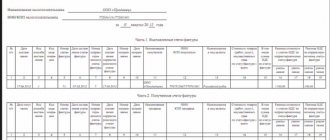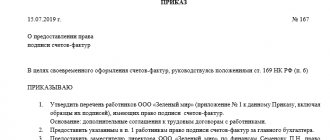Significant errors in the invoice
Errors in invoices are considered significant if they can cause a refusal to deduct VAT. These include errors that do not allow the tax authorities to identify (clause 2 of Article 169 of the Tax Code of the Russian Federation):
1) seller or buyer.
These are errors in the name of the seller or buyer, their address and TIN, due to which the inspection cannot identify the seller or buyer.
For example, in line 6 of the invoice they indicated not the name of the buyer from the constituent documents, but their full name. his employee (Letter of the Federal Tax Service of Russia dated 01/09/2017 No. SD-4-3 / [email protected] ).
You can check the details of the seller (buyer) on the website of the Federal Tax Service of Russia
2) the name of the goods shipped (work, services, property rights).
For example, instead of “rye flour” it is indicated “wheat flour” (Letter of the Ministry of Finance of Russia dated 08/14/2015 N 03-03-06/1/47252).
If this column contains incomplete information, but sufficient to determine the product (work, service, property right), then this does not affect the deduction (Letter of the Ministry of Finance of Russia dated November 17, 2016 N 03-07-09/67406);
3) the cost of goods (work, services, property rights) and the amount of VAT.
For example, these could be:
— arithmetic errors in the cost or amount of tax (Letter of the Ministry of Finance of Russia dated 04/19/2017 N 03-07-09/23491);
— lack of data on the cost or amount of tax (Letter of the Ministry of Finance of Russia dated May 30, 2013 N 03-07-09/19826);
— absence or incorrect indication of the name and code of the currency (Letter of the Ministry of Finance of Russia dated March 11, 2012 N 03-07-08/68);
— absence or incorrect indication of the unit of measurement, quantity (volume) and price (tariff) per unit of measurement (Letter of the Ministry of Finance of Russia dated October 15, 2013 N 03-07-09/43003);
4) the correct tax rate.
For example, instead of a 10% rate, a 20% rate is indicated.
If errors do not interfere with identifying the seller and buyer, the name and cost of goods (work, services), property rights, the rate and amount of tax, then such errors are insignificant and because of them should not be denied VAT deduction (clause 2 of Article 169 of the Tax Code RF).
Can I get a deduction on a corrected invoice?
In the corrected invoice, which the seller draws up in case of detection of significant errors, indicate the serial number and date of the invoice drawn up before the correction was made to it (clause 1, 7 of the Rules).
Therefore, the corrected invoice must be prepared using the form in effect on the date of the original invoice.
The corrected invoice drawn up by the seller upon discovery of a significant error and issued to the buyer must be registered in the sales book in the manner prescribed by paragraph 11 of the Rules.
Thus, the Ministry of Finance of Russia has once again confirmed its position: those errors in invoices that do not prevent tax authorities from identifying the seller of goods (works, services, property rights) are not grounds for refusal to deduct VAT (clause 2 of Article 169 Tax Code of the Russian Federation).
Expert “NA” S.M. Lvovsky
Error in address on invoice
Address errors on the invoice do not have tax consequences for the seller. But they can lead to the refusal of the buyer to deduct VAT. This is due to the fact that this detail is mandatory and helps the tax authority identify the seller or buyer (clause 2, clause 2, clause 5, clause 2, clause 5.1, clause 3, clause 5.2, Article 169 of the Tax Code of the Russian Federation).
However, the invoice contains other data by which the inspection identifies the seller and buyer. These include, in particular, their names and TIN. Therefore, an error in the address does not always lead to a denial of deduction. This was confirmed by the Ministry of Finance of Russia in Letter dated 04/02/2015 N 03-07-09/18318.
If the invoice contains an incomplete address compared to the address in the Unified State Register of Legal Entities (USRIP), this will also not lead to a refusal to deduct if it is possible to identify the buyer based on other invoice details (Letter of the Ministry of Finance of Russia dated August 30, 2018 N 03- 07-14/61854).
If the address matches the address from the Unified State Register of Legal Entities (USRIP), but there are technical errors in its spelling, the buyer can deduct VAT. For example, acceptable (Letters of the Ministry of Finance of Russia dated 04/02/2019 N 03-07-09/22679, dated 04/25/2018 N 03-07-14/27843, dated 04/02/2018 N 03-07-14/21045, dated 17.01. 2018 N 03-07-09/1846, dated 11/20/2017 N 03-07-14/76455):
• abbreviations of words;
• replacing capital letters with lowercase ones or vice versa;
• changing the places of words in the street name;
• additional indication of the country, if this is not in the Unified State Register of Individual Entrepreneurs or the Unified State Register of Legal Entities, etc.
We recommend checking the address with data from the Unified State Register of Legal Entities (USRIP). Data from the Unified State Register of Legal Entities is available on the website of the Federal Tax Service of Russia
If significant errors are found in the address on the invoice, we recommend that the buyer contact the seller with a request to correct the invoice and cancel the registered invoice in the purchase book.
Common Invoice Errors: How Judges Look at Them
DECISIONS IN FAVOR OF TAXPAYERS
Is the right to deduction retained if the seller did not indicate the housing number in the “Buyer’s Address” column of the invoice?
Position of the inspectorate According to subparagraph 2 of paragraph 5 of Article 169 of the Tax Code, the buyer’s address must be indicated in the invoice.
The supplier did not fill out the corresponding column completely, namely, did not enter the housing number of the recipient of the goods. This means that the buyer is deprived of the right to deduct “input” VAT on this invoice. Taxpayer's position The absence of a building number in the buyer's address is not a significant violation of the procedure for filling out an invoice. Such a defect cannot serve as a basis for canceling the deduction of value added tax.
Court decision The buyer provided a package of primary documents allowing the identification of both parties to the transaction - both the seller and the recipient of the goods. The documents clearly show that the buyer was exactly the organization indicated on the invoice. Therefore, despite the slight error in the address, the recipient has the right to a deduction (Resolution of the Federal Antimonopoly Service of the Moscow Region dated March 23, 2009 No. KA-A40/1795-09).
When shipping goods, does the seller have the right to deduct VAT accrued at the time of receipt of the advance payment if the invoice for the advance payment is not completely completed?
Position of the Inspectorate Upon receipt of the prepayment, the supplier issued an invoice, but did not assign a serial number and did not fill out the column “For payment and settlement document No...”. Thus, the invoice was issued in violation of the requirements of paragraph 5 of Article 169 of the Tax Code of the Russian Federation. Based on such a document, when shipping goods, the supplier cannot deduct the tax accrued at the time of receipt of the advance payment.
Position of the taxpayer According to Article 169 of the Tax Code of the Russian Federation, an invoice is the basis for the deduction of VAT presented by the supplier, and not for the deduction of VAT calculated on the prepayment. Therefore, the supplier's right to deduction at the time of shipment is not dependent on whether the prepayment invoice requirements are met.
Court decision To deduct value added tax paid on the advance amount, an invoice is not required. This directly follows from paragraph 8 of Article 171 and paragraph 6 of Article 172 of the Tax Code of the Russian Federation. Thus, it does not matter whether the invoice issued by the supplier upon receipt of the advance payment is correctly drawn up (Resolution of the Federal Antimonopoly Service of North Kazakhstan Region dated March 18, 2009 No. A32-9785/2008-66/117-45/205).
Is it legal to deduct VAT if the invoice is signed by fax?
Inspectorate position The current invoice form provides fields for the signatures of the head of the organization and the chief accountant. It is understood that signatures must be made with one's own hand, and not using cliches. An invoice signed in facsimile is not a basis for deducting value added tax.
Taxpayer's position Neither the Tax Code nor the accounting legislation have rules establishing acceptable methods for signing invoices. Also, the laws do not prohibit the signing of a manager by affixing a facsimile stamp. From this we can conclude that a facsimile signature on an invoice is not considered a violation.
Court decision A facsimile signature is a method of executing an original personal signature. Accordingly, an invoice signed using a facsimile is a properly executed document and does not interfere with deductions (FAS PO Resolution No. A55-6067/2008 dated March 26, 2009).
Editorial comment In this case, the court exactly repeated the point of view expressed by the Supreme Arbitration Court of the Russian Federation in its ruling dated February 13, 2009 No. VAS-16068/08. Most likely, judges will continue to take the side of taxpayers in similar disputes. However, the Russian Ministry of Finance regularly expresses the opinion that a facsimile signature on an invoice is not acceptable (for example, in letter dated January 22, 2009 No. 03-07-11/17). Therefore, it is possible that inspectors will continue to cancel deductions during inspections.
Is it possible to accept a deduction on an invoice that indicates the address of the previous residence of the supplier - an individual entrepreneur?
Inspection position The buyer is an individual entrepreneur. His address, recorded in the unified state register of individual entrepreneurs, does not coincide with the address indicated in the invoice for the supply of goods. This means that the invoice was issued with violations and cannot serve as a basis for deducting VAT.
Taxpayer's position The invoice contains the address of the entrepreneur's previous place of residence. This address is genuine. Therefore, the inspectorate’s statement about the incorrect execution of the invoice is illegal.
Court decision The discrepancy between the address indicated in the invoice and the address registered in the Unified State Register of Individual Entrepreneurs does not indicate the buyer’s dishonesty. As a result, he does not lose the right to deduction (Resolution of the Federal Antimonopoly Service dated March 16, 2009 No. F03-790/2009).
Editor's comment Inspectors can cancel a deduction even if the invoice indicates a legal address that does not coincide with the actual one. However, even here judges show loyalty to taxpayers (see, for example, Resolution of the Federal Antimonopoly Service dated March 24, 2009 No. A55-6902/2008).
Is it legal to refuse to deduct VAT due to the absence of an entry in the invoice register?
Inspection Position The Buyer did not record the invoices received. In addition, the receipt of goods is not reflected in account card 60 “Settlements with suppliers and contractors”. This means that the right to deduct the “input” tax has not been confirmed.
Taxpayer's position The absence of an entry in the journal for recording invoices and turnover in account card 60 is the result of a technical error. Given that all other conditions for the deduction are met, the buyer can reduce the VAT tax base.
Court decision The taxpayer presented a number of documents proving the right to the deduction: correctly executed invoices, a purchase book, an analytical accounting sheet for account 19 “Value added tax on acquired assets”, etc. This is enough to confirm the deduction (resolution of the seventh arbitration appeal court dated 09.22.08 No. 07AP-5336/08, FAS ZSO dated 03.23.09 No. F04-71/2009(2509-A03-42).
When providing services, is it permissible not to include information about the consignor and consignee in the invoice?
Inspectorate's position Subclause 3 of clause 1 of Article 169 of the Tax Code of the Russian Federation clearly states that the invoice must indicate the name and address of the shipper and consignee. If this information is not available, the buyer cannot claim VAT deduction.
Taxpayer's position In the case of provision of services, the goods are not shipped. Therefore, it is impossible to indicate information about the consignor and consignee. An invoice with dashes in lines 3 and 4 meets all the criteria listed in Article 169 of the Tax Code of the Russian Federation.
Court decision When providing services, the invoice may not include information about the consignee and consignor. The lack of this information does not mean that the buyer is deprived of the right to deduction (Resolution of the Federal Antimonopoly Service VSO dated March 16, 2009 No. A78-3515/08-F02-640/09).
DECISIONS IN FAVOR OF TAX FILES
Is a deduction possible based on an invoice issued on behalf of a structural unit of the selling company?
Inspectorate position The invoice must indicate the name, address and identification numbers of the taxpayer and buyer (subclause 2, clause 5, article 169 of the Tax Code of the Russian Federation). According to Article 143 of the Tax Code, organizations are recognized as payers of value added tax. As for separate divisions, they are not VAT payers, but only perform the duties of enterprises in calculating and paying taxes. For this reason, invoices issued on behalf of a business unit cannot be used as a basis for deduction.
Taxpayer's position The Tax Code does not directly state that structural units do not have the right to issue invoices on their own behalf. Consequently, the document was drawn up in accordance with all the rules, and the refusal of the inspectors to confirm the right to deduction is not legal.
Court decision Issuing an invoice on behalf of a structural unit of the supplier is a significant violation of the requirements of the Tax Code. Such an invoice does not give the buyer the right to deduct “input” VAT (Resolution of the Federal Antimonopoly Service VSO dated March 4, 2009 No. A33-3064/08-F02-729/09, A33-3064/08-F02-734/09).
Editorial comment The judges' conclusions coincide with the point of view of officials, who said that the name and address of the company, not the branch, should be indicated as the name of the supplier and its address. Information related to the division must be reflected in the lines that are intended for the seller’s checkpoint, the name of the consignor and his address (letter of the Ministry of Finance of Russia dated April 1, 2009 No. 03-07-09/15.).
Is the buyer’s TIN printed with errors a sufficient basis for refusing a deduction?
Inspectorate position The buyer's identification number is included in the mandatory information on the invoice (clause 5 of Article 169 of the Tax Code of the Russian Federation). An error in the buyer's TIN is tantamount to a lack of information about the true identification number of the recipient of the goods. This circumstance excludes the possibility of applying VAT deduction.
Taxpayer's position A typo in the buyer identification number cannot be considered a significant defect in the invoice. As a consequence, this deficiency cannot serve as a sufficient basis for refusing a deduction.
Court decision In addition to the incorrect TIN, the invoice has other flaws. Namely: there is no information about the origin of the imported goods and details of the cargo customs declaration; Instead of the CEO's signature, there is an autograph of an unauthorized person. All these shortcomings indicate that the deduction of VAT is illegal (Resolution of the Federal Antimonopoly Service UO dated March 23, 2009 No. F09-1560/09-S2).
Editorial commentary Arbitration does not always consider an incorrect TIN as conclusive evidence of a tax violation. As a rule, judges pay attention to other nuances. There are examples when an erroneous supplier identification number did not prevent the deduction, since the taxpayer provided other documents by which the authenticity of the seller and the transaction itself can be easily established (Resolution of the Federal Antimonopoly Service of the Moscow Region dated March 18, 2009 No. KA-A40/2023-09).
Is it necessary to include a detailed description of the services provided on the invoice?
Inspector's position The invoice does not contain a detailed description of the services provided to the company. Instead, a reference is given to the number and date of the contract. Such a document was drawn up in violation of the requirements of Article 169 of the Tax Code of the Russian Federation and cannot serve as a basis for a deduction.
Taxpayer's position The buyer provided all necessary documents for verification: invoices, payment orders and certificates of work performed. Thus, the taxpayer fulfilled all the conditions for deductions specified in Articles 171 and 172 of the Tax Code of the Russian Federation. At the same time, the services provided to the company are described in detail in the contract, so there is no need to list them again in the invoice.
Court decision The invoice form, approved by Decree of the Government of the Russian Federation dated December 2, 2000 No. 914, contains the column “Name of goods (description of work performed, services provided), property rights.” This indicates the need to list the services provided by the counterparty on the invoice. The details of the contract cannot replace the description of the services (decrees of the Third Arbitration Court of Appeal dated December 9, 2008 No. A33-17604/2007-03AP-2645/2008, FAS VSO dated March 19, 2009 No. A33-17604/07-F02-936/09).
Editor's comment Officials insist that if work is performed, it is also unacceptable to refer to the contract details in the invoice. The correct approach is to list the works themselves (letter of the Ministry of Finance of Russia dated January 22, 2009 No. 03-07-09/02).
Incorrect TIN on the invoice
Incorrect TIN indication on the invoice does not entail tax consequences for the seller. But the buyer may be denied a deduction, since this is a mandatory indicator and the tax authority uses it to identify the seller and the buyer (clause 2, clause 2, clause 5, clause 2, clause 5.1, clause 3, clause 5.2, Article 169 of the Tax Code of the Russian Federation ).
However, in a specific situation, the court may side with the buyer.
For example, the AS of the West Siberian District considered that an error in the TIN does not prevent the determination of the VAT amount and the identification of the counterparty to the transaction (see Resolution of the AS of the West Siberian District dated July 18, 2017 N F04-2386/2017).
However, we recommend that you carefully check the completion of such information on the invoice, and if errors are found, ask the seller to make corrections. After all, such a mistake can lead to a dispute with the tax authority.
If the supplier made a mistake in the buyer’s TIN when issuing an invoice
Let’s say that in the 1st quarter, when purchasing goods, an organization deducted VAT on an invoice. In the 2nd quarter, an error was identified in this invoice in the registration of the buyer’s TIN on line 6b:
That is, the supplier incorrectly issued an invoice, in which he indicated the incorrect TIN of the buyer:
Let's study what actions should be taken by the buyer to correct this error.
An error in the TIN is considered critical and makes the invoice defective. An error in the buyer's TIN prevents the buyer from being identified; therefore, the buyer has no right to a deduction on such an invoice.
If errors or inaccuracies are made when issuing an invoice, the seller is obliged to correct it and provide a corrected invoice. In the corrected invoice, the current correction number and the day, month, year of the correction must be written down in line 1a:
The corrected invoice is drawn up in two copies - one for the buyer, and the second remains with the seller.
Instructions for recording a correction invoice are reflected in the table:
Minor errors in the invoice
Minor errors are those that cannot be classified as significant errors. That is, these are errors that do not interfere with identifying the seller, buyer, name, cost of goods (work, services, property rights), tax rate and amount.
An insignificant error cannot be the reason for refusal to deduct VAT (clause 2 of Article 169 of the Tax Code of the Russian Federation).
Minor errors, for example, include:
1) typos in the name and address of the buyer or seller
, For example:
- indication of full name buyer-entrepreneur without the words “IP” (Letter of the Ministry of Finance of Russia dated 05/07/2018 N 03-07-14/30461);
— replacing capital letters with lowercase ones in the names of the seller and buyer (Letter of the Ministry of Finance of Russia dated January 18, 2018 N 03-07-09/2238);
— extra characters, such as dashes or commas (Letter of the Ministry of Finance of Russia dated May 2, 2012 N 03-07-11/130);
- abbreviations in the address, replacing capital letters with lowercase ones or vice versa, reversing words, additional indication of the country if this is not in the Unified State Register of Entrepreneurs or the Unified State Register of Legal Entities (Letters of the Ministry of Finance of Russia dated 04/02/2019 N 03-07-09/22679, dated 04/25/2018 N 03-07-14/27843, dated 04/02/2018 N 03-07-14/21045, dated 01/17/2018 N 03-07-09/1846, dated 11/20/2017 N 03-07-14/76455);
2) violation of invoice numbering;
3) indicating the graphic symbol of the ruble instead of the name of the currency
(Letter of the Ministry of Finance of Russia dated April 13, 2016 N 03-07-11/21095);
4) indication of the code of the type of goods according to the Commodity Nomenclature of Foreign Economic Activity of the EAEU when selling goods in Russia
(Letter of the Ministry of Finance of Russia dated 01/09/2018 N 03-07-08/16);
5) a dash instead of the phrase “without excise tax” in column 6
(Letter of the Ministry of Finance of Russia dated April 18, 2012 N 03-07-09/37);
6) absence of the symbol “%” in column 7 “Tax rate” of the invoice
(Letter of the Ministry of Finance of Russia dated March 3, 2016 N 03-07-09/12236).
Incorrect checkpoint on the invoice
Incorrect indication of the checkpoint on the invoice does not entail tax consequences for either the seller or the buyer. The checkpoint is not a mandatory detail in the invoice according to the Tax Code of the Russian Federation. In addition, an incorrect checkpoint does not interfere with identifying the seller and buyer if other mandatory invoice details (name, tax identification number, address) are indicated correctly (clause 2, clause 5, 5.1, 5.2 of Article 169 of the Tax Code of the Russian Federation).
If the checkpoint is not indicated in the invoice, then the buyer also cannot be denied a VAT deduction if the remaining details of the invoice (name, tax identification number, address) are indicated correctly and allow identification of the seller and the buyer (clause 2, clause 2 p 5, paragraph 2, paragraph 5.1, article 169 of the Tax Code of the Russian Federation).








